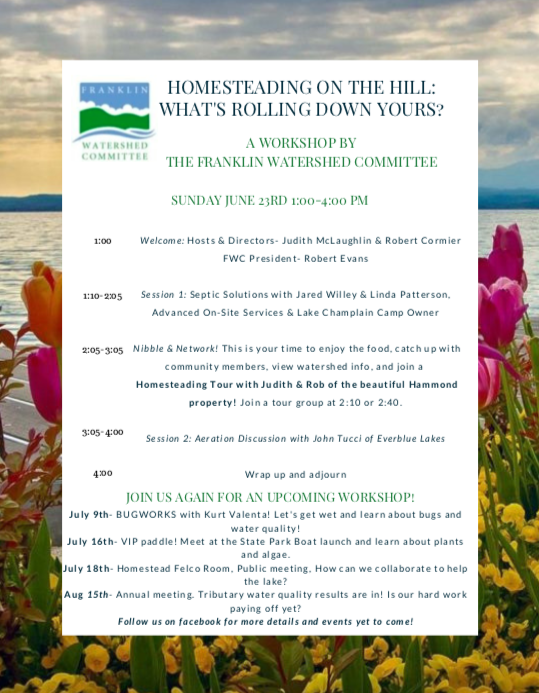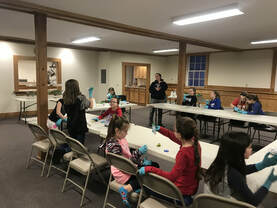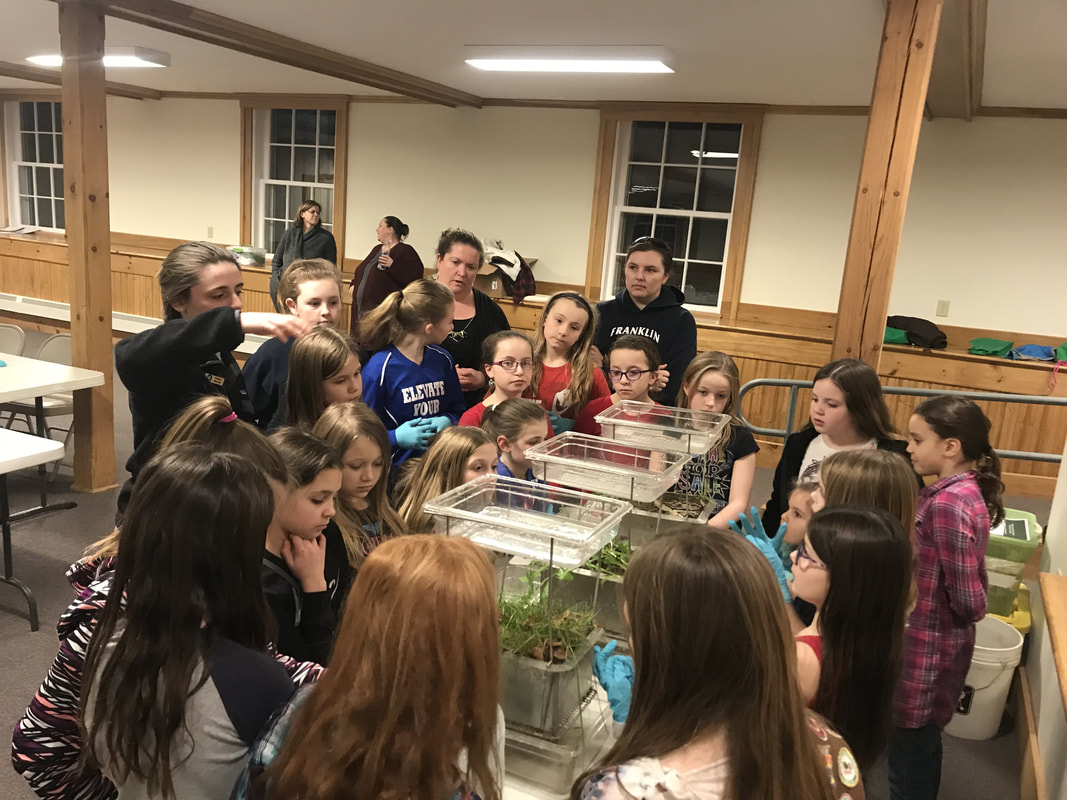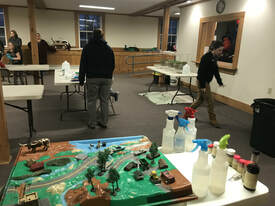Franklin Watershed Committee Board Meeting
The most recent FWC board meeting was held on March 9th, 2023 and included updates about interested new board members, a treasurers report, the Feasibility study for an alum treatment, the water quality board, the boat greeter program, and water quality projects. Katy Dynarski from the Franklin County Natural Resources Conservation District provided the water quality projects update in the slides below!
Marsh Brook Investigations:
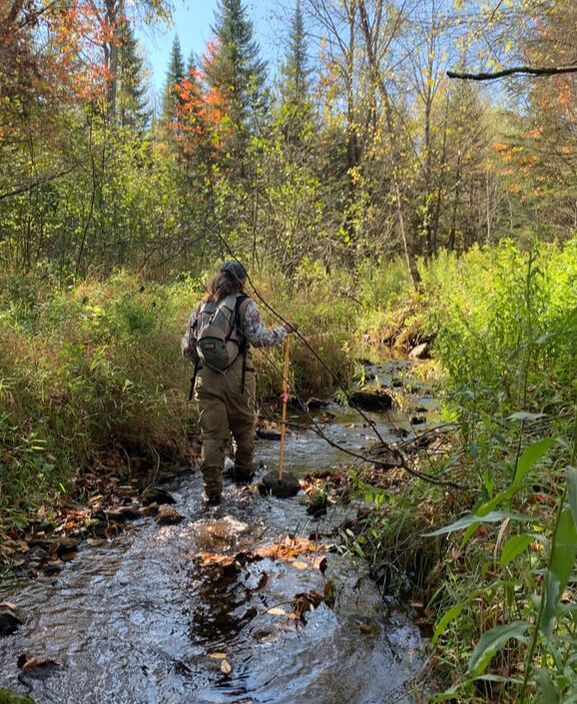
Staci Pomeroy, DEC stream scientist, Karen Bates, DEC Basin planner and Tucker Wehner, FWC assessed the Marsh Brook from mouth to headwaters near Little Pond Road over three days in late September and early October of 2020. The work completed included noting stream’s ability to access floodplain during storm events, degree of restricted flow through culverts, as well as the characteristics of tributaries or drainages that contributed flows to the stream and their watershed. Staci and Karen were very appreciative of Tucker Wehner’s assistance in measuring and note taking. They also appreciate landowners’ willingness to provide permission to walk the stream. Highlights of the walk included discussion with landowners on history of brook, including learning that large stone wall was part of a shingle factory. They were also happy to have had the opportunity to walk a beautiful stream, with its associated wetlands and forested banks, over three days in good company. Staci will complete the Marsh Brook stream geomorphic assessment report by the end of the year and will present her results to the community at a future Carmi Coordination Team meeting. The report will assess the stream’s progress towards meeting a state of equilibrium with watershed processes and characteristics, which will help with gaging the degree to which the stream is a source of excessive sediment as well as a site for sediment deposition as part of its processes towards adjustment in its path towards Marsh Brook.
Franklin Watershed Committee in Montpelier
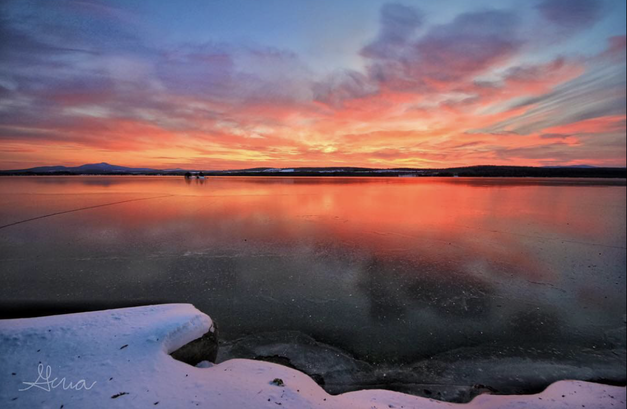
For the 2018 legislative session, several FWC directors and members have been active in Montpelier. President Peter Benevento delivered testimony for the House Committee on Natural Resources, Fish & Wildlife. Several full and part time residence contributed as well. There are several bills being considered this session which we are hopeful will equated to improved water quality for Lake Carmi and other bodies of water throughout Vermont. Thanks to all those joining in the fight for water quality!
For the 2019 legislative session, many members of the community in addition to the Franklin Watershed Committee attended the 2019 Clean Water Policy Forum. Click below for access to the 2019 Clean Water Funding materials we were presented by the Vermont Agency of Natural Resources.
2019 Clean Water Policy Forum
2019 Clean Water Funding Documents
The Franklin Watershed Committee visits the Girl Scouts
We learned about watersheds, erosion and runoff and how they contribute to water quality. Our partners at MRBA brought along their watershed model and rainfall simulators for some great demonstrations. Then we rounded out the evening with some soil nutrient testing and tried to identify the land use of various soil samples. It was a great group of kids. They were very inquisitive and engaged.
Interested in hosting us for a water quality education event? Contact us!
Interested in hosting us for a water quality education event? Contact us!
WikiWatershed- Learn more about watershed modeling and test your project ideas!
On March 15th, 2018 we held the workshop:
WikiWatershed: Estimating changes in water quality with map based computer calculations
It was a free webinar on Wikiwatershed, a freshwater stewardship tool. Dr. David Arscott, of Penn State University, will guided us through the use of this open access tool to simulate runoff and model & monitor our watershed. With this tool we can better understand how nutrient models work and run scenarios such as increased buffer widths, or adding a rain garden to every property, to explore ideas on what it will take to reach the nutrient goals for Lake Carmi.
If you missed this great workshop but would like to learn more about wikiwatershed, use this recorded webinar to learn more about it.
WikiWatershed: Estimating changes in water quality with map based computer calculations
It was a free webinar on Wikiwatershed, a freshwater stewardship tool. Dr. David Arscott, of Penn State University, will guided us through the use of this open access tool to simulate runoff and model & monitor our watershed. With this tool we can better understand how nutrient models work and run scenarios such as increased buffer widths, or adding a rain garden to every property, to explore ideas on what it will take to reach the nutrient goals for Lake Carmi.
If you missed this great workshop but would like to learn more about wikiwatershed, use this recorded webinar to learn more about it.

